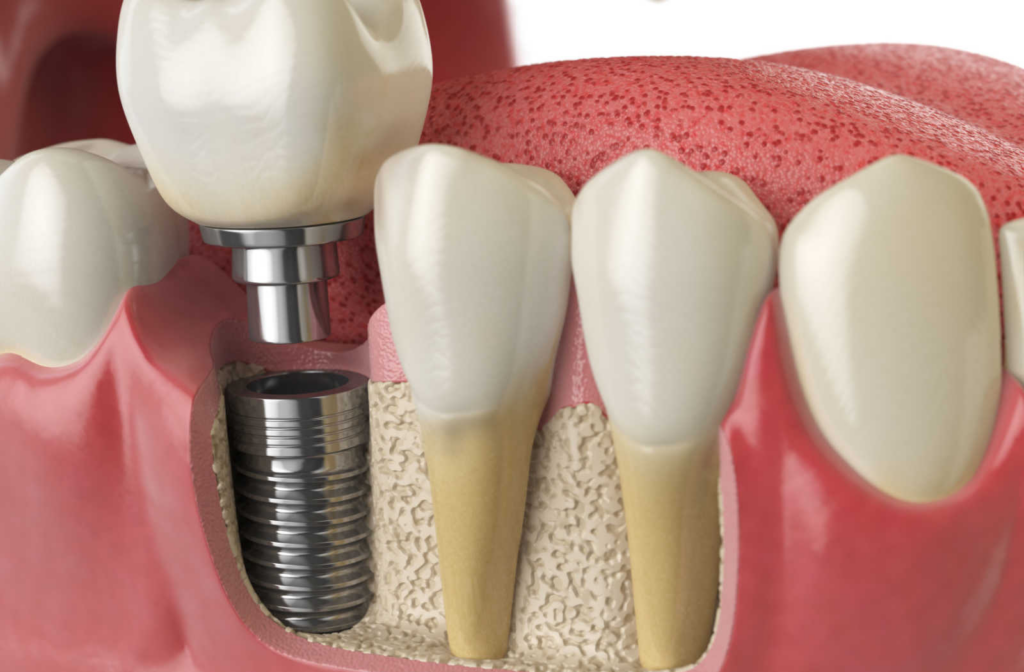Missing or damaged teeth can affect your smile and impact your eating. But there is a solution to this.
Dental implants are a common procedure for replacing missing or damaged teeth to help restore your smile and the function of your teeth. The benefits of dental implants include restored chewing ability, natural appearance, and improved oral health.
Regular dental exams and cleanings are key to optimum oral health. Being mindful of what you eat is also important as it forms part of preventative care. The only thing that could affect dental implants is gum health. If you begin to develop periodontal diseases like bleeding and receding gums, then that would affect the strength of the implant. Therefore, it is important to maintain a good oral hygience to prevent gum problems.
Staying clear of certain foods and following the other recommendations of your dentist can help ensure you enjoy a healthy, functional smile for years.
What Is a Dental Implant?
A dental implant is a replacement tooth root usually made of titanium placed into the jawbone to support a dental prosthesis such as a crown, bridge, or denture. Dental implants are not harmful to the body and can fuse with the bone over time.
Who Can Get a Dental Implant?
Dental implants are often chosen to replace missing teeth when they can help improve a person’s speech or when an individual is unable to wear dentures.
The criteria for getting a dental implant can include the following:
- A fully grown jawbone with adequate bone
- Healthy oral tissue
- No health conditions that can affect bone healing
- Time available to commit over multiple months
- Not smoking tobacco
Dental Implant Procedure
A dental implant procedure usually involves more than one visit to the dentist because of the healing time necessary between each stage.
First Stage
The first stage is placing the dental implant into your jawbone. Because it goes beneath the gum tissue, the gum tissue is stitched into place and allowed to heal. Complete healing can take 4–6 months as the implant integrates with the surrounding bone tissue.
Second Stage
After tissue healing, the second stage involves placing an abutment or a small connector post to the implant. The abutment connects the replacement tooth to the implant. Sometimes, your dentist can do both stages in one appointment.
Third Stage
The third stage involves placing the artificial tooth replacement on the abutment. Depending on the number of missing teeth, an implant can support full arch prosthetics, screwed or cemented onto the implant abutments, or a complete overdenture that fits onto specialized implant abutments.
Advantages of Dental Implants
Dental implants are a popular and effective solution for replacing missing teeth and restoring function and aesthetics to the mouth. They can offer several advantages, including:
- Natural appearance: Dental implants provide a natural look that can feel like your own teeth.
- Permanent solution: Because they fuse with your jawbone, they become permanent.
- Improved speech: Dental implants allow you to speak without worrying about dentures slipping.
- Improved comfort: Because they are permanent, dental implants can eliminate the discomfort that may come when wearing removable dentures.
- Easier eating: Dental implants look and function like your teeth without the pain you can get from sliding dentures, which can also make eating easier.
- Improved oral health: Dental implants can help support your jawbone and oral health because they integrate with the surrounding bone. Also, implants are not susceptible to cavities and decay.
- Durability: Because implants are titanium, they are very durable and can last many years with good care.
- Convenience: Dental implants don’t need to be removed, and they don’t need messy adhesives to stay in place.

Foods to Avoid After a Dental Implant
Dental implants function as your natural teeth and can withstand biting and chewing forces. However, dental implants also require similar care and maintenance to natural teeth to stay healthy and functional.
Unlike natural teeth, dental implants do not develop cavities, leading to gum disease and other oral health problems. However, practicing good oral hygiene habits can prevent these problems from ocurring on your other natural teeth. So you may want to avoid certain foods, such as:
- Sour candies: Has more and different kinds of acids and are chewy, so they stick to your teeth for a longer time and are more likely to cause decay.
- Bread and potato chips: Saliva in your mouth breaks down the starch into sugar. As these stick between your teeth, they can cause cavities.
- Carbonated drinks: Enable plaque to produce more acid, which can attack tooth enamel.
- Ice: Chewing on a hard substance, like ice, can damage enamel and cause chipped, cracked, or broken teeth.
- Citrus: Acid in lemons, limes, oranges, and grapefruit can erode enamel.
- Dried fruits: Sticky and high in sugar, dried fruits can cling to teeth and in their crevices.
Things you can do to help your dental implants last longer include:
- Get treatment if you grind your teeth.
- Practice excellent oral hygiene by looking after your artificial teeth as though they are your natural teeth, such as by brushing, flossing, and rinsing with antibacterial mouthwash.
- Dental implants are only susceptible to periodontal diseases such as gingivitis, swelling and bleeding gums.
- Visit your dentist regularly for dental exams, cleanings, and checkups to ensure the proper functioning of your implants.
Support Your Smile with Dental Implants
With care and attention and avoiding certain foods, dental implants can offer a durable and natural-looking solution for missing teeth. Book an appointment with Kensington Dental Care to get more information and determine whether dental implants can best suit your dental needs.










